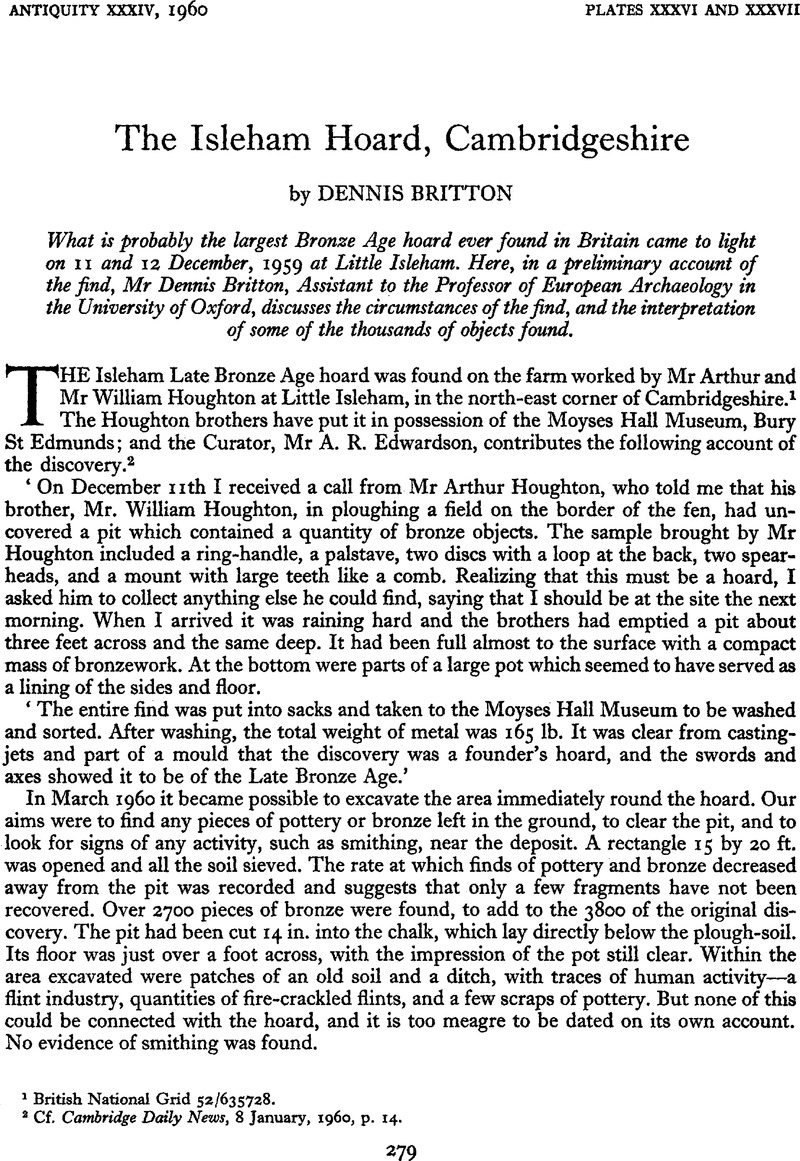Published online by Cambridge University Press: 02 January 2015

1 British National Grid 52/635728.
2 Cf. Cambridge Daily News, 8 January, 1960, p. 14.
3 The figures in brackets after each category are the totals of complete examples plus fragments.
4 By the Oxford Research Laboratory for Archaeology and the History of Art; of 33 analyses, 32 showed leaded bronze.
5 M. A. Smith and A. E. Blin-Stoyle, Proc. Prehist. Soc., XXV (1959), 188-208; simple tin bronze was standard in our Middle Bronze Age.
6 J. D. Cowen, Arch. Aeliana, 4th series, x (1933), 197-8.
7 E.g. Wilburton (Cambs.); J. Evans, Archaeologia, XLVIII (1885), 106-14; and C. Fox, Archaeology of the Cambridge Region (Cambridge, 1923), 58-61, pl. x.
8 E.g. Andover: Proc. Soc. Ant., 2nd series, XXVI (1913-1914), 32-33, pl. opp. 32.
9 Arch. Cambrensis, CVII (1958), 28-34.
10 After the hoard: T. D. Kendrick and C. F. C. Hawkes, Archaeology in England and Wales: 1914-1931, (London, 1932), 124-7, 133-4. pl. XIV; Inventaria Archaeologica, Great Britain, 8th set (London, 1960), GB. 53.
11 J. D. Cowen, as note 6, 190-8.
12 E.g. Guilsfield (Montgomery), with ‘Irish’ socketed axes; cf. H. N. Savory, as note 9, 32-33.
13 E.g. Congleton (Cheshire), with a ribbed socketed axe; cf. T. D. Kendrick and C. F. C. Hawkes, as note 10, 131, pl. XIII, 1.
14 H. N. Savory, as note 9, 30-31 ; C. Fox, as note 7, 58.
15 Cf. M. A. Smith, Proc. Prehist. Soc., XXV (1959), 176.
16 Cf. C. M. Piggott, Proc. Prehist. Soc., XII (1946), 121, 126 ff.
17 As note 15, 144-87.
18 Inventaria Archaeologica, Great Britain, 1st set (London, 1955), GB. 7, 1.
19 Inv. Arch., Great Britain, 1st set (London, 1955), GB. 6, 6.
20 Inv. Arch., Great Britain, 7th set (London, 1959), GB. 43, 15.
21 C. Fox, as note 7, pl. VIII, 2 c; cf. C. Fox, Proc Prehist. Soc., v (1939), 223 ff.
22 Archaeologia, LXXX (1930), 4 ff.
23 Antiq. Journal, XXXVII (1957), 131 ff.
24 Cf. M. A. Smith, as note 15, 146 ff., e.g. fig. 2, 3 and 10, on 147.
25 E. Sprockhoff, Jungbronzezeitliche Hortfunde (Periode V), I, (Mainz, 1956), 195-8; cf. II, Taf. 46.
26 Other ‘phalerae’ in Britain: C. F. C. Hawkes and M. A. Smith, as note 23, 155-6; also cf. E. Sprockhoff, Jungbronzezeitliche Hortfunde (Periode IV), (Mainz, 1937), 52, Taf. 21, 5.
27 With perforations in two planes; cf. C. F. C. Hawkes and M. A. Smith, as note 23, 156.
28 For the principle, cf. T. G. E. Powell, Arch. Journal, CV (1948) 32-34.